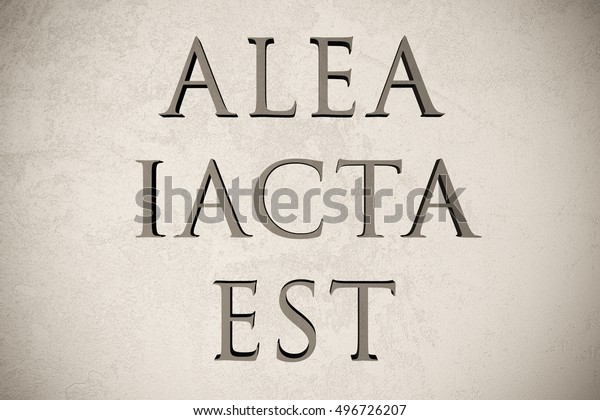
Oh I say chaps, steady on, you'll make me blush. Miss Dennis' explanations are always a joy to read. It is even possible, but I am not sure about that anymore that alea actually referred to a type of game itself that used dice. Victoria's answer is a model of clarity and concision. Actually in Latin the phrase 'alea iacta est' does not allow that much ambiguity as alea refers to the die in the context of a die game. : : : I would have said something like that (but much less well) but VSD got there first.

: : : : By the way, he didn't "sail" the Rubicon! It's a piffling little river, nowadays called the Fiumicino, which you can wade across. If Caesar had been talking about metal-casting, he would have used the verb "fundare" (the English word "foundry" is related), and his quotation would have been something like "Forma fundata est", or Matrix fundata est". : : : : Similarly, the verb "jactare" means "to throw", and does not mean "to cast molten metal" in any possible context. It does not mean die in the sense of a mould for casting the Latin for that was "forma" or "matrix". The Latin noun "alea" means literally a "die" as in half-a-pair-of-dice, or figuratively "luck, chance, hazard". In the original Latin, what Caesar said was "Alea jacta est". : : : : I'm afraid that Caesar was certainly not alluding to anything of the kind. Dies (molds) of this sort were certainly used in Ceasar's time, so this may be what he alluded to as he sailed the Rubicon. A complicated explanation, but it seems likely to me. But the "die", or mold, itself is often formed by "casting" (sort of a chicken and egg thing.you need a die to cast a die.) So if one uses the term "the die is cast", to mean "we must now rely on fate" it means the "mold is already made", and nobody can change what the result of the molding will be. : : : : : A "die" (apart from being one of a pair of dice) is a still-used term for a hollow mold used to form or "cast" things like mechanical parts and decorative statues by holding molten metal until it cools. : : : : : The phrase "The die is cast" likely has a more literal origin than the one provided on your site.


In Reply to: The die is cast posted by Steve E on July 25, 2005 The phrase is Latin for 'The die is cast.' This is what Julius Caesar said on January 10, 49 BC as he crossed the lake Rubicon in Norther Italy while he prepared for an extended municipal war with the Roman Senate as well as its allies. Posted by Victoria S Dennis on July 25, 2005 Alea iacta est meaning in Urban Dictionary.


 0 kommentar(er)
0 kommentar(er)
